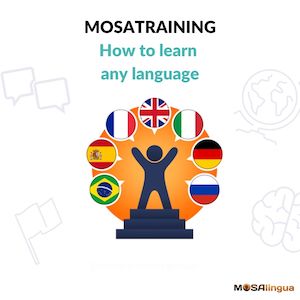If you’re looking to learn a new language, you might want to know: what is the easiest language for English speakers to learn? I get it! It’s only natural to want to start easy—that way we tend to make progress quicker, right? That’s why we’ve put together a list of the 5 languages that will be easiest for you to learn if you already speak English. We’ll rank all five of them, from easiest language to learn from English to least easy. Read on to find out which languages they are!
Last Updated: 05/14/2022

Don’t forget, you can also listen to our podcast on this topic via the MosaLingua Language Lab:
Listen to “#49 – The Easiest Languages For English Speakers to Learn” on Spreaker.
What’s inside…
Top 5 Easiest Languages to Learn for English Speakers
If you’re curious, here is the scoring breakdown for the 5 languages included in our list, as well as some of the close runners-up. Read to the bottom of this article to find out more about our methodology:
| Ranking | Language | Lexical Similarity | Ease of Grammar | Ease of Pronunciation | Access to Practice Resources | Average Rating |
|---|---|---|---|---|---|---|
| 1 | Italian | 52/100 | 80/100 | 90/100 | 95/100 | 79/100 |
| 2 | Spanish | 43/100 | 80/100 | 90/100 | 95/100 | 77/100 |
| 3 | Dutch | 73/100 | 75/100 | 84/100 | 70/100 | 76/100 |
| 4 | Norwegian (bokmål) | 76/100 | 75/100 | 83/100 | 60/100 | 74/100 |
| 5 | German | 69/100 | 50/100 | 84/100 | 93/100 | 74/100 |
| 6 | Danish | 80/100 | 75/100 | 78/100 | 60/100 | 73/100 |
| 7 | Afrikaans | 73/100 | 80/100 | 90/100 | 50/100 | 73/100 |
| 8 | Swedish | 73/100 | 75/100 | 85/100 | 60/100 | 73/100 |
| 9 | French | 41/100 | 80/100 | 70/100 | 95/100 | 72/100 |
| 10 | Romanian | 45/100 | 65/100 | 70/100 | 65/100 | 61/100 |
#1: Italian 🇮🇹
Overall easiness: 79/100
Let’s get right into it, with the easiest language you can choose to learn. The easiest language for English speakers to learn is Italian!
Italian is a Romance language, therefore it’s not from the same language family as English. However, because it’s derived from Latin, it contains many similar words to English. Look at the following, for example:
- volcano = vulcano
- fiasco = fiasco
- quality = qualità
- broccoli = broccolo
- attention = attenzione
- motto = motto
Though Italian isn’t as widely spoken as Spanish, we’re still exposed to it a lot. Just think of all the different food words you know (pizza, spaghetti, gelato, mozzarella)! Italian music is very popular all over the world, too, particularly opera, classical, and disco. You can find many resources to learn Italian, making it a very accessible language to study.
Italian pronunciation is also quite logical. Like Spanish, you pronounce many words just as you write them. After learning the alphabet and basic pronunciation rules, it’s pretty easy to master. One difficulty you might find when speaking Italian is the melody or “intonation.” And it also has that tricky rolling “r” sound.
So, is there anything difficult about learning Italian?
Italian grammar may cause some problems for English speakers due to the different articles and prepositions. Italian also has the confusing subjunctive tense (which even some native Italian speakers make mistakes with!). However, it’s important to note that Italian grammar isn’t more difficult than Spanish or French grammar.
Italian is a beneficial language to learn for the business world, it’s particularly useful if you have a career in music, fashion, art, or design. It’s also considered by many to be one of the most beautiful languages in the world!
#2: Spanish 🇪🇸
Overall easiness: 77/100
Spanish falls into second place. One of the easiest things about Spanish is pronunciation. Words are pronounced as they are written. The main difficulty English speakers come across with Spanish pronunciation is the rolling “r” sound, as in carro (car). It can take a lot of practice, as we don’t have this sound in English. But our Spanish instructor Mirari recorded a video specifically to teach you to pronounce this sound! Click here to check it out on our YouTube channel.
Spanish also contains many similar words to English. Look at these, for example:
- correct = correcto
- electricity = electricidad
- contract = contracto
- attention = atención
In fact, there are more than 10,000 Spanish-English cognates!
We’re exposed to Spanish a lot in our everyday lives, in music, TV, and film. In fact, Spanish is the second most spoken language in the world. So not only is it easy to access the language (meaning there are tons of quality Spanish resources available), it’s also a very useful one to learn!
But what’s the catch? Why isn’t Spanish THE easiest language to learn for English speakers?
Well, Spanish grammar rules can be a little tricky at the beginning. They take time to learn and get used to, particularly if you’ve never studied another language before. There are lots of verb conjugations, and many learners get confused with the past tenses in Spanish.
The nouns also have genders. While you can sometimes guess whether a noun is masculine or feminine by looking at the end of the word (if it ends in “o,” it tends to be masculine; if it ends in “a,” it’s usually feminine), this isn’t always accurate and can trip you up. For example:
- hand = la mano (f.)
- radio = la radio (f.)
- day = el día (m.)
- sofa = el sofá (m.)
So, it’s clear that grammar is the trickiest thing to learn when it comes to Spanish! But Spanish is a very enjoyable language to learn and speak.
I’ve found Spanish to be extremely useful when traveling. I’ve used it in different countries in South America and Spain, but also in countries where Spanish isn’t the native language, just because it’s spoken so widely all over the world. If you learn Spanish, you’ll find it much easier to make friends with people wherever you are!
#3: Dutch 🇳🇱
Overall easiness: 76/100
Coming in at number three is Dutch. We consider Dutch one of the easiest languages for English speakers to learn due to its close similarities in terms of vocabulary. Take a look at the following words and see just how close they all are to English:
- cultural = culturele
- historical = historische
- name = naam
- wife = wij
- water = water
- book = boek
Dutch has borrowed many words from other languages, including English: “Ik he been badhairday” means “I am having a bad hair day.” “Je moet out of the box denken” means “You need to think outside the box.”
What difficulties might an English speaker face when trying to learn Dutch?
Dutch grammar is quite similar to English, making it relatively straightforward. However, word order can be tricky. Sometimes, verbs are placed at the end of the sentence. But sometimes they aren’t. The rules aren’t very consistent, which might take some time to get used to.
If your native language is English, Dutch pronunciation won’t be too difficult. Many consonant sounds are pronounced the same. The most difficult sounds will be the guttural “g” sounds.
In terms of accessibility, there are enough resources available to begin learning Dutch from the comfort of your own home. There are 23 million native Dutch speakers, found mostly in the Netherlands, Belgium, and the Caribbean. So learning Dutch would be beneficial if you wish to travel to these places. I highly recommend you do!
What’s more, Dutch shares many similarities with Afrikaans. Learning Dutch will make learning Afrikaans much easier. So you’re kind of learning two languages at once!
How to learn any language

News flash: those people aren’t any smarter than you are, and they don’t have any kind of special gift for language learning, either. It’s all because of the methods they use. Practicing with the latest and most effective techniques, along with a few expert tips, is a recipe for success.
It can work for you, too! MosaTraining combines all of these tips and techniques into one comprehensive, hands-on approach to language learning.
#4: Norwegian 🇳🇴
Overall easiness: 74/100
Next up is Norwegian. Norwegian is also a Germanic language, so it also shares many similar words with English.
If we look at vocabulary in Norwegian and English, we can see many similar words. For example:
plant = plante
lamp = lampe
person = person
problem = problem
Norwegian pronunciation might seem a little tricky at first, as it contains many vowel sounds that English speakers aren’t used to pronouncing. However, there are so many different Norwegian accents and dialects that there is no “one correct way” of pronouncing words. This can be considered an advantage!
It’s a little different with writing, however. There are actually two official forms of Norwegian: Bokmål (“book tongue”) and Nynorsk (“new Norwegian”). They are both widely used, but Bokmål is used more commonly in writing.
As for grammar, it’s pretty straightforward. There’s only one form of each verb tense and you don’t need to conjugate the verbs based on the subject. Look at the verb “to have”:
to have = ha
I have = jeg har
you have = du har
he has = han har
we have = vi har
In terms of accessibility, Norwegian is not a particularly widely spoken language. You won’t really come across the language outside of Norway. However, you can still find a decent amount of online learning resources.
In addition, Norwegian people are known for being friendly and helpful. They’d probably be happy to help you learn their language while you’re visiting. 😊
Many people consider Norwegian the easiest Scandinavian language to learn because it’s somewhere between Danish and Swedish. It’s easier to understand than Danish, and its vocabulary is closer to English than Swedish. So it’s also a good starting point if you want to learn all three languages.
#5: German 🇩🇪
Overall easiness: 74/100
And finally, the “least easy” language out of the 5 easiest languages to learn for English speakers we’ll be discussing today. In fifth place, we have German, which shares many similarities with English. English is a Germanic language — there’s roughly 60% lexical similarity between the two languages.
The most difficult aspect is the grammar, which is quite different from English. The nouns have three different genders: masculine, feminine, and neutral. Also, the word order can be a bit tricky, as there are no hard and fast rules, making it difficult to get this correct when you begin learning.
How about pronunciation? At the beginning, German pronunciation can seem intimidating for an English speaker but it’s actually quite easy to master. Once you start studying German, you’ll find that the pronunciation is consistent and phonetic. After learning the alphabet, you’ll be able to pronounce almost any word in German.
German is very close to English in terms of vocabulary. Look at the following words. I bet you can guess their meanings in English:
- Oktober
- Telefon
- Foto
- Finger
- Buch
In addition, the German language uses many common English words:
- Baby
- Bus
- Hotel
- T-shirt
So it’s pretty easy and quick to memorize many German words and phrases. In addition, German is a very accessible language with lots of online learning resources and courses available, so you’ll have a lot of options!
So, why learn German?
German has 95 million native speakers and 210 million speakers worldwide. It’s also the fourth most used language online. From a business standpoint, German can be a very useful language to learn. Many German businesses are front-runners in their respective industries.
And let’s not forget that German is a language of literature, music, art, and philosophy. If you enjoy the music of Beethoven or Wagner, or the works of Goethe, then learning German will allow you to enjoy and appreciate these works to the fullest!
Other Top-Ranking Languages That Are Easy for English Speakers
Danish 🇩🇰
Interestingly, Danish people are considered the most proficient at English in the world. This isn’t just because they’re taught English at school, but because of the similarities between the two languages. Take a look at the names of the months, for example (some of them are spelled exactly the same!):
januar, februar, marts, april, maj, juni, juli, august, september, oktober, november, december
Now let’s take a look at the grammar. There are two genders in Danish, and they’re indicated by the articles “en” and “et.” But it’s not too hard with a little practice!
And a major plus: there’s only one form of the verb for each tense, so you don’t need to conjugate the verb based on the subject.
So, it would seem that both grammar and vocabulary are relatively easy when it comes to learning Danish. Now, let’s move on to the more difficult aspects of the language.
What makes Danish tricky?
By far the most difficult thing about Danish is the pronunciation. Though many Danish words might look familiar when written, knowing how to pronounce them correctly is a whole other ball game. Like English, Danish is not a phonetic language. Words aren’t necessarily pronounced the way they’re written. Danish contains vowel sounds that an English speaker won’t have come across before. It also contains many silent letters, in particular, the silent “d” is very common.
Furthermore, you might find it challenging to interact with a native Danish speaker. Danish people are known to speak very quickly, and they also drop the ends of words, making it difficult to understand what they’re saying. But the best way to improve your speaking and listening skills in any language is to expose yourself to as much of it as possible!
Although Danish isn’t very widely spoken (you won’t find many people speaking it outside of Denmark), there are still a fair amount of resources online. However, there are definitely not as many resources for learning Danish as there are for many of the other languages on our list.
French 🇫🇷
French is a Romance language, so while it’s not from the same language family as English, it’s derived from Latin and therefore contains many words similar to English. The degree of lexical similarity is much lower than that of any of the Germanic languages discussed, with a score of only 27/100. However, you will find that many words have been passed between the two languages, for example “ballet,” “baguette,” “restaurant,” and “weekend.”
French is very accessible to learn nowadays, with French-language music and films being popular all over the world. What’s more, there are many online resources for learning French, with all major language apps offering French courses.
So, what aspects of French are difficult?
Well, pronunciation definitely makes it one of the more difficult languages on this list. French contains lots of vowel sounds and many of them are new sounds for English speakers. In addition, the “r” sound in French can be difficult for native English speakers, as it also doesn’t exist in English (un crayon). However, it does get easier after some practice and exposure to the accent. French also contains many silent letters, particularly at the end of words. This can make pronunciation quite difficult to master.
French grammar can also be difficult, as it contains more verb conjugations than English. If an English speaker has never learned another language before, this can be confusing and take a lot of time. There are lots of different endings to learn and memorize, never mind the irregular conjugations! French also has the infamous subjunctive, used in certain situations to indicate subjectivity, doubt, or unreality. It can get a little confusing, but don’t feel too bad — many native French speakers struggle with it too!
However, if you’ve already learned another language with similar conjugation rules (e.g. Italian or Spanish), this definitely becomes easier to wrap your head around.
In addition to conjugations, noun gender can be confusing for English speakers. Unlike Spanish, where it’s fairly easy to decipher whether a noun is masculine or feminine by its final letter, the rules surrounding gender are less concrete in French.
Overall, we still consider French one of the easiest languages to learn as it shares a lot of vocabulary with English and offers a vast array of learning materials.
Bonus Language: Esperanto
Another language I’d like to mention in this video is Esperanto. Esperanto was created with the intention of becoming a universal language for communication. Although it never became as popular as intended, many people throughout the world still learn and speak it.
Many people consider Esperanto one of the easiest languages to learn for the following reasons:
- The grammar is straightforward (there are no irregular verbs or tenses and the verb conjugations are relatively easy). And there are only 16 rules to learn to master Esperanto grammar.
- In terms of pronunciation, Esperanto is similar to Italian and Spanish. It is phonetic. That means that pronunciation aligns with spelling.
- Many words in Esperanto have been selected so that they’re easily recognizable and easy to remember for anyone who speaks a European language. For this reason, Esperanto could be a great language to learn as a “stepping stone” to learning other languages.
- Esperanto is not as widely accessible as other languages we’ve mentioned. However, it’s definitely an interesting language to learn and many people who speak Esperanto are very proud of the language and want to share it with others.
How We Determined the Easiest Language to Learn for English Speakers
Here are the criteria we used to determine which languages to put on the list:
- Lexical similarity (How similar it is to English, i.e. how similar the vocabulary is. For this, we mainly used the websites elingustics.net and ethnologue.com)
- Ease of grammar
- Ease of pronunciation
- Access to learning resources (How accessible it is—can we find learning tools easily?)
These criteria helped us come up with an overall score and enabled us to rank the languages. As well as the two websites already mentioned, we used some additional sources for the other criteria, such as the US Foreign Service Institute Language Difficulty Ranking. We also discussed the topic with language experts here at MosaLingua and other language learners who have shared their personal experiences learning some of these languages.
Summary: What is the Easiest Language for English Speakers to Learn and Why?
TL;DR — these are the world’s easiest languages, at least for English speakers:
- Italian: Easiest language for English speakers to learn. Pronunciation is easy after you learn the basic rules. Vocabulary isn’t too difficult. Lots of resources are available. Grammar can be challenging.
- Spanish: Pronunciation and vocabulary are quite easy to pick up. Vast array of resources available. A widely spoken language. Grammar can be difficult.
- Dutch: Contains similar words to English. Grammar is relatively simple. Fair amount of learning materials available. Pronunciation can be quite difficult.
- Norwegian: Vocabulary and grammar are straightforward. Pronunciation can be difficult, but there are many accents in Norway so you can get away with different ways of pronouncing things. A fair amount of learning materials available.
- German: Vocabulary is similar to English. Pronunciation is consistent and phonetic, but grammar can be quite challenging. Lots of easy-to-access resources.
So, there you have it! The 5 easiest languages for English speakers to learn, according to our ranking.
I have to say that this was not an easy task. If you’re surprised not to see Danish and Afrikaans in the top 5 count, it’s because we took many criteria into account and these languages ended up close behind the others!
Lizzie Explains Why Italian Is the Easiest Language for English Speakers to Learn [VIDEO]
You can also watch Lizzie’s video on the topic below, or on our YouTube channel. The video is in English, with subtitles available in 6 languages. To turn them on, or to slow down or speed up the playback, click the Settings icon (⚙️) in the bottom corner of the player.
Be sure to subscribe to our YouTube channel!
Next Steps…
If you enjoyed this article, you might also like our articles on the following language-learning topics:
- Are the Most Spoken Languages in the World the Ones You’re Thinking Of?
- What Are The Most Studied Languages in the World?
- Ranking the World’s Sexiest Languages [VIDEO]
- How Polyglots Learn Languages: 7 Polyglot Secrets for Everyday Learners
And if you’re looking for a bit more of a challenge, we have another podcast that might interest you:
Listen to “#60 – The Top 5 Most Difficult Languages To Learn” on Spreaker.









How come The Portuguese language is not mentioned? It’s just as hard to learn as Spanish or Italian…… Lads pf cognates and some false cognates…. Brazilians can understand Spanish much, much better Spanish-speakers can understand Brazilian Portuguese. I can’t see why Italian is the easiest one chosen by you….?
Hi there,
Thanks for your message.
The article is about the easiest (not the hardest) languages to learn for English natives
Portuguese is actually considered harder than Spanish by most people who learn it as a foreign language due to many aspects, including the fact that Portuguese has more phonemes than Spanish, which explains what you mention: “Brazilians can understand Spanish much, much better Spanish-speakers can understand Brazilian Portuguese”.
The ranking doesn’t reflect our (or anyone’s opinion). It was based on 4 criteria that are stated at the bottom of the article, under the subheading: How We Determined the Easiest Language to Learn for English Speakers
I hope this clears things up!
Samuel W